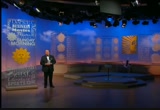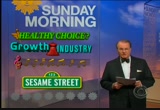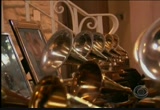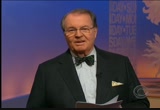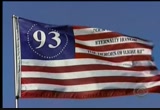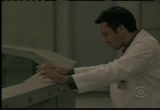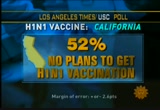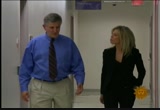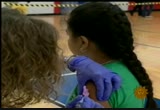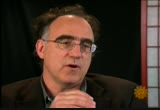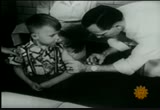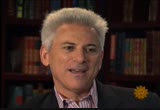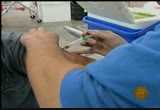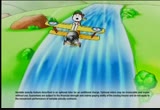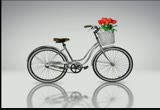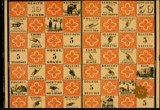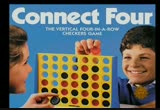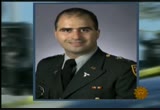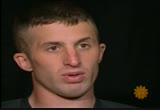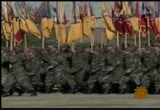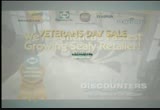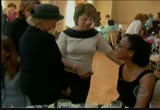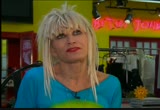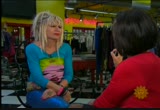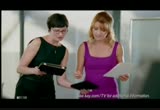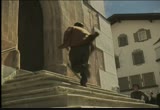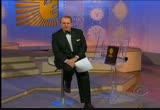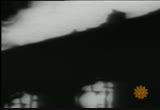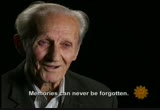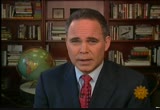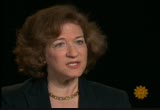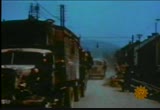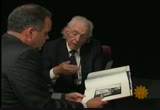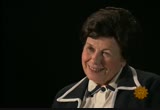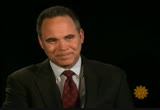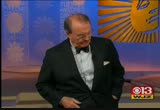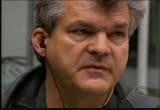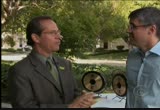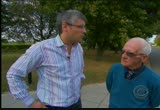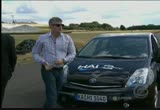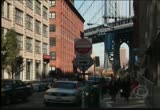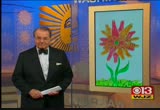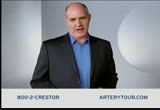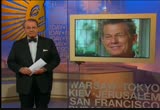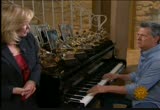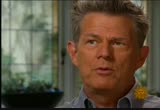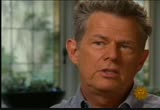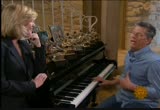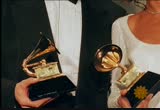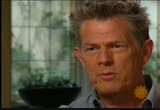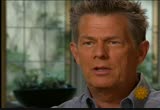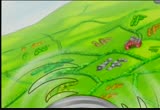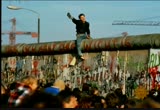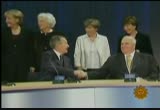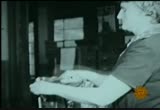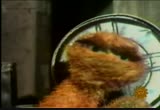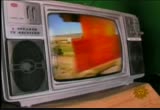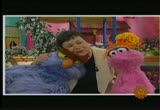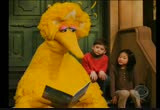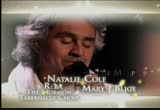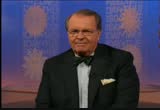tv CBS News Sunday Morning CBS November 8, 2009 9:00am-10:30am EST
9:00 am
9:01 am
>> osgood: good morning. i'm charles osgood and this is sunday morning. of all the questions facing our country there's one in particular that touches us in an immediate and personal way. it involves the h1n1 flu vaccine. many perplexed americans, the question comes down to this. is the vaccine really a healthy choice? there's no shortage of opinion on this question. it's not just medical experts who are having their say. tracy smith will be reporting our cover story. >> about 15 minutes we'll start. thank you very much. >> reporter: millions have taken the h1n1 vaccine. but there are millions more who doubt they want it or even need it. what do you think is more infectious, h1n1 or fear? >> i think fear is the most infectious thing on the planet at the moment. i'm hoping it's not the most dangerous but i could being wrong about that. >> reporter: later on sunday morning, stuck over vaccination. >> osgood: talk about a growth industry. with so many americans putting on extra pounds, the fashion world is finally recognizing the obvious and scrambling to keep up.
9:02 am
michelle miller tells us about it. >> reporter: model krystal renn starved her way on to the runway. >> being thin worked for you for a while. >> reporter: being thin never worked for me. >> reporter: today she's a top plus-size model with the average american woman now wearing 164 pounds krystal is in good company. designers like betsy johnson are starting to pay attention. >> if it's left up to just dressing our skinny mini-s, we'll be out of business. >> reporter: dressing a full- figured america. later on sunday morning. >> osgood: the hitman we want to tell you about how no sinister intentions just long- standing desire to please audiences with some of the most popular songs of our time. sandra hughes will pay him a visit. ♪. >> reporter: he's discovered talents like celine dion and josh grob in, produced records that have produced half a
9:03 am
billion copies, won 15 grammys. this is an impressive collection of accolades. >> could i just say that i brought them out for you. they don't really normally sit here. >> reporter: later on sunday morning, we'll sit down with david foster, producer, songwriter, hit man. >> osgood: the children's tv show sesame street celebrates a big birthday this week. martha teichner will be telling us about that. >> reporter: big bird still says he's six years old. how can sesame street be turning 40? it is! on tuesday. seen in 140 countries, the creators of sesame street call it the longest street in the world. in mexico city, i personally met big bird's cousin. you're very tall. later this sunday morning, sesame street. aging gracefully.
9:04 am
>> osgood: jim axelrod tells a little known story of a small country's heroism during world war ii, mo rocca sounds alarm about noise. the fast draw folks demonstrate how humans swim tate nature and more. but first the headlines for this sunday morning, the 8th of november, 2009. >> the bill is passed. >> osgood: the house late last night voted to provide medical insurance coverage to millions of americans currently without it. the vote clears the way for the senate to take up the legislation. major nidal hasan, the man accused of thursday's shooting rampage that killed 13 people and wounded 30 at fort hood in texas is now said to be off a ventilator. he remains in intensive care at a military hospital. we'll have more on the fort hood shootings later on sunday morning. >> let's roll. >> osgood: with those wounds ground was broken in shanksville pennsylvania where a permanent memorial to the passengers and crew of the
9:05 am
flight that crashed on the field on 9/11, 2001. today's weather. the south is preparing for hurricane ida, now churning up waters in the gulf of mexico. but for most of the country today will be warm and dry. ida, would could strengthen in the coming hours, is expected to make land fall on the gulf coast tomorrow. the rain will extend throughout the south and east. next, vaccines. a shot in the dark? and later, meet the music man.
9:08 am
>> osgood: is the h1n1 flu vaccine a healthy choice? despite what we've heard from public health authorities, some americans have their doubts. our sunday morning cover story is reported now by tracy smith. >> reporter: what if they threw a mass vaccination and nobody came? >> about 15 minutes we'll go ahead and start. thank you very much. >> reporter: sure, the h1n1 vaccination centers are crowded. but for every man, woman, or child lining up for a dose of the vaccine, there may be more at home with doubts about whether they should. >> just sniff, sniff. >> reporter: a nationwide cnn poll taken last month found that only 49% of those asked considered the h1n1 vaccine safe. according to an l.a. times/usc poll released on friday, a majority of registered voters in california are planning on
9:09 am
skipping the h1n1 shot altogether. >> there's a substantial minority that may become a majority of people who are saying, i think i'll wait. i don't think i'll line up right now and get swine flu vaccine for myself or my child. >> reporter: barbara low fisher, co-founder of the private national vaccine information center and a critic of vaccines, says we just don't know enough about the h1n1 vaccine to make an informed decision. >> what's the true nature of this outbreak? what are the true risks of the vaccine for different people? i don't think we have all those answers. >> reporter: so in the absence of information? >> i think it's perfectly legitimate for people to question whether or not they should get vaccinated. >> reporter: how controversial is vaccination? >> it's controversial. i mean it's in the newspaper or magazines or television shows almost on a weekly basis. >> reporter: dr. paul offit,
9:10 am
chief of the infectious diseases division at the chimp's hospital of philadelphia and a champion of vaccines sees things differently. >> we know a lot about this vaccine. we've been making a vaccine very similar to this for the last 60 years. we know that this vaccine induces an adequate immune response. we know what it can protect your child. why would you ever choose not to get it given everything you know about the disease and everything you know about the vaccine. >> reporter: even if i get my children vaccinated, if you don't get your children vaccinated, are you threatening me this. >> of course because no vaccine is 100% effective. there is actually a wonderful study done in the netherlands between 1999-2000 where they looked at an outbreak 4,000 people that got measles. they found that you were much more likely to get measles if you were fully vaccinated, highly vaccinated live living in a relatively unvaccinated community because you were protected by that population. >> reporter: it's called erd i
9:11 am
am unity. infectious diseases just can't spread when large numbers of a population are immune. but to achieve herd immunity with h1n1, dr. offit says more than 90% of the herd needs to be take the vaccine. and therein the problem. >> if you choose not to get the h1n1 vaccine, then you're choosing to subject your child to get a virus which has already caused tens of thousands of people to be hospitalized and more than 100 children to be killed. we have every reason to know that that vaccine is going to be safe and effective. it's a terrible choice not to get h1n1 vaccine. it's the wrong choice. >> reporter: the debate over vaccines is nothing new. it actually began in the '20s, the 1720s, with a crude smallpox innoculation. journalist arthur allen. >> this is actually the earliest form of vax nan... vaccination that even came before edward jenner. this involves taking live smallpox from a smallpox sore
9:12 am
and rubbing it into a person's arm or leg. >> reporter: benjamin franklin was an early skeptic but changed his mind after he lost a four-year-old son to smallpox writing in his autobiography that i long regretted bitterly and still regret that i had not given it to him by innoculation. by 1796, initialman edward jenner proved that scratching the relatively mild cow pox into a person's skin would stave off smallpox. after that millions eventually lined up arms bared. >> the idea that really spread around the world with remarkable speed considering there was no internet or anything like that. you know, jenner became an international sort of hero. one of the first sort of medical heroes in history. >> reporter: he went viral. >> he did, as it were. >> april 26, 1954. nationwide field trial vaccination nicknamed the shot heard round the world.
9:13 am
>> reporter: talk about medical heroes. jonas salk was a super star when he officially rolled out a polio vaccine in 1955. yes, there were adverse reactions. even deaths from the salk vaccine but to many it was an acceptable risk given the prospect of life in a wheelchair or worse. >> good evening. the government has suspended the nationwide swine flu innoculation program and some health officials are saying privately it will never be resumed. >> reporter: the public vaccine has taken a few hits through the years like 1976, for example, when a vaccine for is swine flu was associated with a paralyzing nerve disease. so when the h1n1 vaccine program was announced, not everyone cheered. what do you think is more infectious, h1n1 or fear? >> i think fear is the most infectious thing on the planet at the moment. i'm hoping it's not the most
9:14 am
dangerous. but i could be wrong about that. >> reporter: in a new book journalist michael specter says that fear and mistrust are driving people into denial about scientific progress. you know, the truth is pharmaceutical companies have lied to the american public in the past. shouldn't we be skeptical? >> yeah, if we're not skeptical about everything, we're nuts. denialism is when you get thousands of studies one thing and you just say i don't care. i don't care because i'm not going to have the measles shot because it doesn't matter how much studies say this is going to work, the risk is relatively low. i'm still going to hide. people don't think in terms of risks. every decision we make is a risk. but they don't think what is the risk of not getting this vaccine? they only hear stories about the one in a thousand people who do have reactions. that happens. it's like plane crashes. we all know a story about a plane crash. no reports one reports the 19 millionaire miles each year where everyone gets hurt.
9:15 am
>> reporter: for some the h1n1 vaccine is not an acceptable risk, at least not yet. >> it's not the lethal pandemic that was feared in the spring. so, you know, we have to all pray that this is going to remain a moderate outbreak. there is certainly no indication at this time that it's going to be any worse than it is right now. >> reporter: but we could do more than pray. we can get vaccinated. >> and certainly you can get vaccinated. that absolutely is your choice. absolutely. >> osgood: your move. next up, the games people play. if i'm too exposed to downturns. if i'll go through my savings too fast. to help you feel more confident consider putting a portion of your savings in a metlife variable annuity. when the market goes up, it gives your assets a potential to grow. while protecting you if the market goes down with a steady stream of income.
9:16 am
let america's number one annuity provider help you stay on course with guarantees for the if in life. get answers about annuities at metlife.com. it's critical that i stick to my medication. i cannot be one of the 61 million americans who do not refill their prescriptions on time. readyfill at cvs pharmacy automatically refills my prescriptions and reminds me to pick them up. you mean, reminds me to pick them up. [ chuckles ] stop by your local cvs pharmacy to ask if readyfill is right for you. readyfill, only at cvs pharmacy.
9:17 am
♪ the game of life ♪ you will learn about life when you play the game of life ♪ >> osgood: now a page from our sunday morning almanac. november 8, 1836. 173 years ago today. when the games began. board games, that is, with the birth of a baby boy named milton bradley. by age 24, this self-taught printer had settled in springfield massachusetts where a chance encounter with a foreign-made board game led him to invent his own. he called it the checkered game of life. it required real-life business skills such as thrift and
9:18 am
enterprise to win. the game was a huge success and launched milton bradley into the board game business big time. with a huge factory in springfield. though milton bradley the man died in 1911 at the age of 74, milton bradley the board game manufacturer survived and prospered. >> now from milton bradley, it's.... >> osgood: constantly expanding its product line. >> brand new milton bradley game. >> osgood: and as for the milton bradley board games were the staple in the early days of children's tv. >> right foot green. >> osgood: and a high stakes round of twister played against the grim reaper was on a high point in the movie bill and ted's bogus journey. milton bradley was acquired by hasbro in 1984 and continues as a subsidiary today producing such games as twister, battleship, connect-
9:19 am
four, and of course the game of life. >> osgood: just ahead, a troubled time. nowhere. who do you feel like seeing? no one. depression hurts is so many ways. sadness. loss of interest. anxiety. cymbalta can help. cymbalta is a prescription medication that treats many symptoms of depression. tell your doctor right away if your depression worsens, you have unusual changes in behavior or thoughts of suicide. antidepressants can increase these in children, teens, and young adults. cymbalta is not approved for children under 18. people taking maois or thioridazine or with uncontrolled glaucoma should not take cymbalta. taking it with nsaid pain relievers, aspirin, or blood thinners may increase bleeding risk. severe liver problems, some fatal, were reported.
9:20 am
signs include abdominal pain and yellowing of the skin or eyes. talk with your doctor about your medicines, including those for migraine, or if you have high fever, confusion and stiff muscles, to address a possible life-threatening condition. tell your doctor about alcohol use, liver disease, and before you reduce or stop taking cymbalta. dizziness or fainting may occur upon standing. side effects include nausea, dry mouth, and constipation. ask your doctor about cymbalta. depression hurts. cymbalta can help. depression hurts. with crest whitestrips advanced seal. you'll start seeing a whiter smile after just three days. so you can share a brilliant smile with the ones you love. crest whitestrips advanced seal, the no-slip whitestrips. new anti-aging eye roller. reduces puffiness immediately -- and also helps with lines and wrinkles. not surgery. this is our way to do your eyes. new regenerist anti-aging eye roller.
9:21 am
at world record speed. i'm luke myers. if you want to be incredible, eat incredible. announcer: eggs. incredible energy for body and mind. (guitar music) >> osgood: thursday's shootings at fort hood in texas have prompted a hot of difficult questions. don teague this morning goes in search of answers. >> reporter: three days after military officials say army major nidal hasan killed 13
9:22 am
people and wounded 30 others in a fort hood medical processing center, investigators are still trying to determine why. chris gray with the army's criminal investigation division. >> we have not established a motive for the shootings at this time. >> reporter: corporal nathan hewitt still can't believe what happened. >> i can't make any sense of it. >> reporter: hewitt who is set to deploy for a second iraq tour in january was waiting for a flu shot thursday in a room full of soldiers when he heard someone yell. >> it sounded like the beginning of a muslim prayer. allah akbar. >> reporter: the next thing hewitt heard was gun fire. he dove for cover but was hit by two bullets. still he thought it was all a training exercise. he says other victims thought the same thing. >> to see how quick people react and what people do to react. >> reporter: hewitt only realized it was real after first crawling and then running to safety.
9:23 am
>> i didn't actually realize i had been shot until they took me in to another building. it was like pull up your pant leg. blood started coming out both sides pretty much. >> reporter: witnesses say hasan kept firing, 100 rounds, even after he was struck four times in a shootout with civilian police woman kimberly munley. while he remains in i.c.u. at brook army medical center, relatives are providing more details, that he was distressed about a pending tour of duty overseas and had hired a lawyer to block it. that he had loudly objected to the u.s. war on terror as a war on islam. and that he felt harassed because of his muslim faith. hasan's uncle in ramallah. >> i recall a couple of things maybe. he told me that >> reporter: fort hood the largest military installation in the u.s. holds a special place. not just for 53,000 active
9:24 am
duty soldiers who serve here but for america. at 340 square miles, it's the only post big enough to house and train two armored divisions. its soldiers critical to every major conflict since world war ii. >> a large of the army goes through there at one time or the other. >> reporter: steve russell is an oklahoma state senator and former battalion commander at fort hood where one out of ten active duty soldiers is based. >> very rare that people would go through an entire career and never be at fort hood. >> reporter: even elvis presley served here. he didn't stay long. but others move here and never leave. comforted by an extended army family that's become all too familiar with tragedy. the 1991 mass murder of 23 people at the cafeteria happened just a few miles from the main gate. at least 75 fort hood soldiers have committed suicide. and with so many soldiers deployed in harm's way, flags here are too often at half
9:25 am
9:27 am
>> osgood: clothing that's well proportioned has become very much a growth industry. as part of our now and again look at size matters, here's mirnal miller. >> reporter: no matter how styles change, one thing it seems is always in. thin. even outrageously thin. ♪ i can give you what you want ♪ >> reporter: the internet was abuzz last month over these digitally slenderized ads showing impossibly thing ralph lauren models. the company says the release was a mistake but it struck a nerve. and on this topic, says "washington post" fashion editor robin givan, that's not
9:28 am
unusual. >> we react really strongly to the fact that they have this sort of idealized body type that is virtually impossible for anyone else to attain. fashion is constantly saying, come on. you know you want to be this. you know you want to wear this. >> reporter: but the divide has never been bigger between the clothes these models wear and the ever larger customers who buy them. in 1960, the average american woman was 5'3" and weighed 140 pounds, roughly 40 years later, she had grown an inch and now weighed 164 pounds. the average dress size in america today? 14. >> i think we're getting more real all over the place. >> reporter: the figures speak for themselves. and increasingly designers like betsy johnson are taking notice. >> let's dress more women because if it's left up to
9:29 am
just dressing our skinny mini-s, we'll be out of business. there ain't enough of 'em. >> reporter: she's launched a plus-size lingerie line. designers like michael koors and calvin klein have plus-sized clothing lines. >> the plus-size market is a growing market. >> reporter: industry analyst dana tellsee. >> we're seeing more companies dip their toe in the water. >> reporter: sales are up and so is visibility. j.c. penney has begun to use larger minkins. >> this will give you a more realistic viewpoint. what that does for the customer is when you look at it it says, oh, that's what it's going to look like on me. >> reporter: glamor magazine has decided to put more real- sized women in its pages and commissioned this photo of seven plus-sized models. >> they're not actually plus size humans. most of them are between an 8 and a 12 which is smaller than the average american woman. >> reporter: cindy levy is
9:30 am
glamor's editor in chief. >> we're celebrating their curves. we're celebrating the fact that, look, listen, there are a million different ways to look beautiful. >> reporter: no one is happier to be in the picture than krystal renn. at age 14 a scout told her she could be a top model. one catch. >> he said, yes, but you just have to lose nine inches off your hips. i thought nine inches. oh, nine. >> reporter: what size were you when he told you this? >> a size 14. >> reporter: krystal dieted and exercised obsessively until she weighed 98 pounds. >> at my smallest i was a size double-o. yes. meaning basically that the 0s in the clothing store would fall off me. >> reporter: she moved to new york and became a model. being thin worked for you for a while. >> being thin never worked for me. i was very, very very sick. i felt it every day. >> reporter: but it wasn't enough. for her modeling agency. >> they pointed at my thighs
9:31 am
and said you need to bring these down. i just snapped. i told them, you have no idea what i'm doing. i could die. >> this is the division that i work with. >> reporter: she began eating again sensibly. >> it starts with a size 8 and goes up to a 20. >> reporter: today at 5'9" and 165 pounds, krystal works as a plus-size model. >> my success is much greater than when i was starving myself. i have to say it's really because i have found who i am supposed to be. i am confident. >> reporter: but will the fashion world make room for more krystal renns? when the german women's magazine announced that it will show only real women in its pages, designer carl lagerfeld commented no one wants to see round women. and for all her love of curves, designer betsy johnson says sometimes only a skinny model will do.
9:32 am
why do fashion designers believe that clothes look better on a size 0 or a size 2? >> i hate to say it. but they do. it they look better on the models. ♪ i can give you what you want ♪ > still krystal renn remains hopeful. >> all women in this country are different. they're all different sizes. they want to be represented. >> reporter: for women of all sizes, the runway remains the last frontier. >> osgood: ahead, a story of survival.
9:35 am
for many who survived the nazi holocaust. the anniversary of krystalnach. it provides an opportunity to remember the bravery of the righteous. jim axelrod has the story of two remarkable people. >> reporter: joanne newman is on the journey more than 70 years in the making. a journey that started in germany. how old were you when you left hamburg? >> eight. i had just had my 8th birthday. >> reporter: what do you remember of the leaving of hamburg? >> very much because this was such a dramatic experience. >> reporter: her life changed in the violent darkness of november 9, 1938. during krystalnach, the night of broken glass. the nazis launched a vicious assault on jewish communities, looting homes, destroying businesses, burning synagogues. it was an ominous preview of
9:36 am
the horrors to come. her father feared where his country was heading, so he began making preparations to flee. young joanne tagged along with him on a devastating errand in the basement of their apartment building. >> he had all of the correspondent and photography, photographs and so on. of his youth and of his life. he had made arrangements with the superintendent of the house that he could burn the things in the furnish ace. like every piece that he burned was like a piece of his life. >> reporter: a few months later, little joanne and her parents were gone. leaving germany for good. but on this day, joanne's journey home won't take her back to germany. instead she's returning to an unlikely safe haven and a reunion with her improbable family.
9:37 am
>> reporter: this man is anxiously waiting to greet the woman he hasn't seen the more than 60 years. >> how are we going to be with each other? whether we will cry or not cry, kiss, i don't know. >> reporter: they say that he is joanne's cousin. at least that's what they told the nazis. >> the families around us did not know they were jews. mother spread the word that all of them were my cousins from germany. >> reporter: that was the cover story. >> that was the cover story. we were germans from germany and they were their family. >> reporter: there were a number of extraordinary examples of people who risked and sometimes lost their lives hiding jews from the nazis
9:38 am
during world war ii, but chances are you've never heard of one like this because they were in albania, a 70% muslim country in south eastern europe. >> the gem of this story is that albania took in refugee jews. >> reporter: this woman has written a book about jewish refugees during world war ii. >> europe 1938, '39, '40, even '41, we see it as a totally closed universe. and jews were looking for holes, for openings. people began to whisper. they hear if you get to albania, you will be safe. >> reporter: safe because of a cornerstone of albanian culture known as bessa. the promise to treat strangers as if they were family and guard them with their lives. >> it has to do with a certain sense of honor. an honor code that they take
9:39 am
very seriously. so it's not simply to give someone something. a bed for a night. a hot meal. it is really to offer protection. >> reporter: like their& neighbors, these people adhered closely to besa and to their muslim beliefs that also emphasized the protection of others. >> the role of albanian culture and tradition, and the religious influence of islam came together. >> reporter: her mother was of german heritage. she married an albanian embracing both besa and islam especially after the nazis occupied albania. she proudly tells the story of her mother affecting a german accent to throw off the nazis growing suspicious of joanne
9:40 am
and her family, not once but twice. >> mother got angry and nervous and told them, "you came once. but a second time?" jews, i don't even know, so i won't make any sense to come back because i will explain. it's shameful. they al suited and left. >> reporter: joanne and her parents were hiding in plain sight. here you are now coming in contact with german soldiers. >> i certainly was doing the occupation very much afraid that i wouldn't live the next day. >> reporter: according to the international school for holocaust studies, over the course of the occupation, the albanians did not turn over a single jew to the nazis. at the end of the war, there were more jews living in albania than before. it's an extraordinary record. so how is it that so few people know about it?
9:41 am
>> nearly no one knows about this story. >> reporter: why is it not known? >> because of the shutters that went down on albania so soon after 1945 and the draconian communist regime in that... for the next half century. by the time the shutters lifted, what happened half a century ago was not to urgent as people's everyday needs right then and there. >> i had to find out what these people did and why they did it. >> reporter: as seen in the upcoming documentary god's house photographer norman ger beman traveled to albania to document surviving members of familiar laes that saved jews during the holocaust. among them, adid. >> what is he holding here? >> the plaque that honored his mother and father as righteous among the nations where joanne and her family gave testimony
9:42 am
that, yes, this family saved our lives. >> reporter: the allies took joanne and her parents out of albanian in 1945. >> it was very upsetting for me. >> reporter: joanne says her own parents always wanted to make up for the way they parted with this family. >> we were told that we cannot even go and say good buy because there was danger that we might get arrested. it was much to my parents' really regret. terrible regret. >> reporter: no chance to say thank you. >> no chance to say thank you. >> reporter: finally, decades later, she had her chance. this was joanne's journey. 62 years. when you saw him again, can
9:43 am
you describe that reunion. >> well, in a way it was a little bit strange because i left a little boy and here was an old man. it was really emotional. no question about it. >> reporter: after the war, joanne's family settled safely in the united states. but in newly communist albania, a very different fate awaited the other family. they went from being the protectors to the oppressed. their life together as a family ended in tragedy when a his father was arrested and executed by the communist regime. >> he was such a good human being. he was shot for what. >> reporter: joanne has spent years trying to honor the family that saved hers. her deepest satisfaction came only recently in a conversation with adid's daughter. >> i got my reward. she said, i am so proud to know what my grandparents did. that was really my main
9:44 am
purpose. because he was executed by the communists. what do the grandchildren think of their grandparents? >> reporter: one look at adid's face tells the whole story. >> i see a very modest son and very proud of his family. in saving the people who were desperate. >> these people were courageous. they were righteous. and they were just wonderful people. >> osgood: next,
9:47 am
honking) excuse me. not just cell phones. we're talking about all the noise, all the time. all around us. actually it's mo rocca who is doing the talking. >> noise. some people pay good money to hear it. but most of us try to avoid it. and the world keeps getting noisier, right? (a lot of noise) >> if you're a fan of science fiction, you know that the world of the future is supposed to be quiet. doors that don't slam but slide. hover craft that whoosh by. a world humming along to the
9:48 am
barely audible whir of the computers powering everything around us. if you're paying attention to the world as it actually is, then you know that it only seems to be getting louder. >> noise is information you haven't decoded yet. >> reporter: bruced onland and sam are artists who work with sound. >> 1, 2, 3. >> reporter: they define noise of that rumbling combination of racket, ruckus that city dwellers learn to ignore. >> what if it means decode sound. >> well, we're expert non-listeners because there's so much that doesn't make sense to us that we actually withdraw from our incredible abilities to hear like a
9:49 am
hunter-gatherer. we've withdrawn from those wonderful evolutionary skills we had to survive. >> reporter: we're not even trying. >> we're trying not. we look at ourselves in the mirror endlessly so we never listen to ourselves. we've become a culture that is rather deaf. >> reporter: they say our eyes won out over our ears long ago. when a noisy question meant a productive economy. a little noise was a small price to pay for mass industrialization. it was the sound of progress. >> this is the bass drum. this is the grum... drum set of our economy. that's partly why people get frightened when they go some place silent. there's nothing going on. >> reporter: noise is an afterthought or it's a by- product? >> or a stream of the economy. if we were truly concerned about efficiency, it wouldn't sound like this.
9:50 am
>> reporter: that's because, they argue, noise is wasted energy. quiet machinery is actually more efficient. think hybrid or electric cars. in the meantime, we are drowning in noise. and there's big money to be made canceling and controlling all this clatter. meet the ceo of serious materials. >> it is is twice as loud to your ear. forget the math and everything else. 50 db to your ear is twice as loud as 40 which is twice as loud as 30. >> reporter: how many db are you right now? >> i talk around 65 db. >> reporter: really? so my eardrums should be exploding. >> it's pretty loud except there's slight bursts. if i was talking at 85 db (talking louder) which i could probably do.
9:51 am
>> reporter: i need to be soundproofed right now. >> i probably overloaded the mikes. >> reporter: and people seeking a little peace and quiet have made his company a serious success. the technology for producing sound has outstripped the technology for soundproofing. >> very much. >> reporter: listen to this gong. (gong sounds) >> now hear this gong that suppresses sound. (thud) (loud song, and then thud) >> i can tell you standing behind this gong it's easily 120 dbs. you hit it good and hard. >> reporter: i needed the emperor to hear it. >> he heard it all right. >> reporter: could things ever get (whispering) too quiet? remember those hybrids? automobiles that are pretty
9:52 am
silent are are an issue for you. >> most certainly. you see because we use the sound of the vehicle not only to determine the fact that there is a vehicle approaching but also to get an estimated distance away. >> reporter: sure. spencer westthorpe is 95% visually impaired. he pointed out for the blind, the elderly and small children, a silent car can be a silent killer. (loud noise) that's why car makers like lotus have introduced technology to make hybrid and electric cars noisier. the chief engineer at lotus engineering. you think that people will be customizing their cars for safety reasons and for other reasons, enjoyment reasons, to sound like a whole range of things. >> that's right. you've got total freedom like on your phone these days beings change your ring tone as you like. you can change the sound of your car as well. (ring tone) >> reporter: customized sound
9:53 am
for your vehicle. that's right. a ring tone for your car. oh, this is spaceship. i'm in spaceship mode. >> chaiseship one. >> reporter: let's go to chaiseship two. this sounds like crisis. this sounds like something is wrong, like lotus, we have a problem. can you bring it back to the silent mode? if you think the sound of a spaceship cruising down your cul-de-sac might be disorienting, you're right. that's why japan is considering mandating a uniform car sound for hybrids. of course, too little sound is hardly our biggest hearing problem. as bruced onland and sam allenger showed me on a visit to one of new york's most expensive neighborhoods. we're on the brooklyn waterfront overlooking manhattan.
9:54 am
this is very, very pricey real estate. >> absolutely. obviously they're appeal to go the eye not the ear because if they were making the real estate valued on the acoustic environment it's a total nightmare. >> reporter: the sound meter barely went below 80 decibels. >> i mean you can barely think. you're walking down the street here with your little girl. you're going to have to shout to her. do you want an ice cream cone (shouting) >> reporter: she's going to think that you're really angry because of all the noise. >> absolutely. >> reporter: yeah, it would be a lot lovelier if you didn't have to shout (shouting). >> don't take it personally. >> osgood: want to hear more? check out mo rocca's "tomorrow" show tomorrow. >> velcro was inspired by those annoying little burrs. >> osgood: up next it's only natural. boss: so word's gettin' out that geico can help people save in even more ways -
9:56 am
on motorcycle insurance, rv, camper, boat insurance. nice work, everyone. exec: well, it's easy for him. he's a cute little lizard. gecko: ah, gecko, actually - exec: with all due respect, if i was tiny and green and had a british accent i'd have more folks paying attention to me too... i mean - (faux english accent) "save money! pip pip cheerio!" exec 2: british? i thought you were australian. gecko: well, it's funny you should ask. 'cause actually, i'm from - anncr: geico. fifteen minutes could save you fifteen percent or more on car insurance. >> osgood: scientists in search of an energy-efficient
9:57 am
world have an ally in mother nature. here's mitch butler and josh landis of the fast draw. >> if you're trying to build a better mouse trap, why not ask a cat. human engineers spend a lot of time in research and development, but the earth has spent 3.8 billion years in r&d. we're realizing we still have a lot to learn. it's called biomimicry. copying nature. >> this is a way of inventing and this is a kind of design that you find everywhere in the natural world. >> you might that velcro was inspired by those anowing little burrs that stick to your pants when you walk through the woods. now nature-inspired designs are sprouting every day. termite mounds get hot in the sun. but by opening and closing passages, the little bugers funnel cool air in and hot air out in an automated self-sustaining air flow. today this design is keeping people cool for free in this
9:58 am
building in zimbabwe. where do you think this design for a wind turbine came from? a flower? an insect? it's actually from a whale whose fins have ridges on the back that reduce turbulence. that allows windmills to generate power where they never could before in places with low spend speed. >> every day, nature's technology is becoming a bigger part of your life. at the airport there's a new system that allows security to see objects hidden beneath clothing. it's a camera that sees waves similar to sound waves. someone figured that one out a long time before you. >> you can thank animals forgetting you there faster. years ago the speed of airplane was maxing out because the air couldn't get... a falcon can hit speeds of more than 160 miles an hour. so how does it breathe? it turns out it has a small cone-shaped structure in its nostril that's in airplanes today. >> the author says nature's
9:59 am
design secrets have remained secrets because biologists and engineers never really compared notes. >> biologists don't know how the human world is made. and people who design our world, you never have to take a biology course. most engineers never take a buy ol gee course. >> but in these green times, things are coming together. the result? better design. more efficient environmentally friendly technology. today manufacturing cement generates more greenhouse gas than most other industries. but what about seashells? they are chemically similar to cement. when they grow, they absorb greenhouse gas. a company is mimicking that process and making cleaner cement. maybe some day all those miles of road out there could clean the air. biomimicry is changing the way we stay safe, keep cool and move. who knows what else we have to learn because nature's r&d department still holds a lot
10:00 am
of see decrees. why a spider's silk by weight five times stronger than steel? sure, man can walk on the moon but he still can't make clean energy out of thin air and sunlight like a simple blade of grass. >> the fast draw on sunday morning is sponsored by michelin, a better way forward. >> osgood: next, we get the score from david foster. why are you such a grouch? >> well, i can't see any reason to be pleasant. >> osgood: and later, you never know who you'll meet on sesame street.
10:01 am
there's a big reason to lower high cholesterol... dangerous plaque that can build up in arteries. it's called atherosclerosis--or athero. and high cholesterol is a major factor. but crestor can help slow the buildup of plaque in arteries. go to arterytour.com and take an interactive tour to learn how plaque builds up. and then ask your doctor if crestor is right for you. along with diet, crestor does more than lower bad cholesterol and raise good. crestor is proven to slow the buildup of plaque in arteries. crestor isn't for everyone, like people with liver disease, or women who are nursing, pregnant, or may become pregnant. simple blood tests will check for liver problems. you should tell your doctor about other medicines you're taking or if you have muscle pain or weakness.
10:02 am
that could be a sign of serious side effects. learn more about plaque buildup at arterytour.com. then ask your doctor if it's time for crestor. if you can't afford your medication, astrazeneca may be able to help. ♪ all that we've been through ♪ ♪ i will make it up to you >> it's sunday morning on cbs and here again is charles osgood. >> osgood: hard to say i'm sorry was a hit song for chicago. with a little help from the hit man, david foster.
10:03 am
it turns out he's been behind some very familiar tunes. right now he's getting ready for the holidays. sandra hughes has this sunday profile. ♪ better not cry ♪ better not pout > the man playing piano has been behind some of the& biggest hits of the past 40 years. he's david foster. music producer. >> we have to shorten that last note. >> reporter: songwriter. arranger. hit man. ♪ that you made me feel > he says his music is pop, as in popular. sweet and romantic. >> when i put my hands on the keyboard, naturally that's what comes out. it's not, you know, (different
10:04 am
tune). that's just not where i naturally go. i go here. >> reporter: where he's gone is to the top of the music business. his records have sold half a billion copies. he's been nominated for 44 grammys, winning 15. >> this was produced for natalie cole, unforgetable. celine deonin 1996. >> reporter: the list of collaborators goes on and on. ♪ i was born by the river >> reporter: earth, wind and fire. chicago. whitney houston. madonna. michael jackson. barbra streisand. josh grob in. michael bu play. the definition of what a music producer does. >> i guess the best answer to
10:05 am
that would be that when the artist is weak, we do everything. when the artist is strong, we fight to make them as great as they can be. ♪ there's a place for us > the fighting can sometimes cause fireworks. as when he produced the broadway and back-to-broadway albums with barbra streisand. >> she is a control freak like i am. yes, we've had situations in the studio that were flared. but this is two perfectionists trying to achieve greatness. >> reporter: the results? one of foster's favorite songs. ♪ >> my mantra is to be great every day because good is the enemy of great. for sure. so to be good is so easy. i mean, you know this in your own work. you can go interview, you can be good with your eyes closed
10:06 am
but to dig down and make me cry.... >> reporter: i could do that if i started singing. >> that's true. >> reporter: these days he's working with a long-time friend. on a christmas special on pbs, a new album and a tour. david foster grew up in british columbia in a supportive family with six sisters. >> my recollection is that my childhood was perfect. >> reporter: with the gift of perfect pitch and the love of music. an early band called skylark brought him his first hit wild flower. foster made his way to los angeles as a keyboardist, and then began producing and writing songs. sometimes on the spot. >> i was lying to barry gordie, the president of motown records when he said do you have any other songs? i lied and i said sure i have
10:07 am
plenty. i sat down at the piano with nothing. and in a moment i did the lyrics and the melody and everything. i went, oh, yeah, i have another guy and it goes like this. ♪ after the love is gone ♪ what used to be right is wrong ♪ >> reporter: "after the love has gone" became a top ten hit for earth, wind and fire. he received his greatest lesson early when the legendary producer quincy jones. foster gave him an album he just produced but told him to listen to only a few tracks because the others weren't that good. >> he said, are you an idiot? i mean, are you an idiot? give me that thing. what does that say right there? i said produced by david foster. he said, yeah, that's your name. if it cannot be absolutely 100% your very best effort, then you better not put your name on it.
10:08 am
>> reporter: foster's name usually spells success. like when he produced whitney houston's "i will always love you" for the movie "the body guards." >> i tried to put that moment where if you're in the audience in the middle of the song you're going to go (clapping) in the middle of the song. ♪ everything gets quiet. you think the song is over. boom. ♪ and i... > and she goes off into the key change, right? ♪ i will always love you > critics haven't always loved foster's music calling it elevator music. >> i remember reviews like rolling stone saying when i produced boss skags album, david foster has succeeded in plunging the dagger in his back and the blood is all over his white suit. >> reporter: but many of the artists who record with him
10:09 am
appreciate his golden touch. >> i was working with him. he was leaving the studio. he stopped at the door. he said the album you made for me has changed my life in the most profound ways. >> reporter: that's so nice. >> i mean, that's a huge reward. you know? the critics can take it and shove it up their ass. >> reporter: still the reward for his charitable work. foster wrote and produced voices that care, the entertainment industry's salute to the troops in the first gulf war. and in canada his david foster foundation has helped hundreds of families children in need of organ transplants. foster has been nominated for three oscars including for the duet "the prayer."
10:10 am
perhaps foster's greatest gift has been nurturing young talent. he found celine dio n'syncing at a picnic near montreal. ♪ josh grobin was still in high school when a teacher sent foster a tape. >> he called on the phone. he has such a big personality. josh, david foster. how are you? i liked your tape. a little flat but you'll be okay. i'll get you going. >> reporter: michael buble was literally the wedding singer. >> i did find him singing at a wedding. all i can see and hear is this
10:11 am
magnificent voice. >> reporter: and his latest find, 17-year-old cheris. he saw her on u-tube from the philippines. what's cool about working with somebody like david foster? >> what's cool? he doesn't want a good album. he wants a great album, the best album. >> reporter: success hasn't come as easily in his private life. three failed marriages. >> do you see me squirming? >> reporter: yeah, you're squirming. >> you're not contributing. >> reporter: his third marriage played out on a reality show called the princes of malibu about life with his two stepsons. >> no more credit cards. none. >> reporter: what were you thinking about? >> what was i thinking? i was pretty much just a jerk throughout all the episodes. a lot of it was staged. some of it was real angst.
10:12 am
>> reporter: was the (coughing) show helpful for your marriage? >> (laughing) the show broke up my marriage. >> reporter: at 60, the hit maker still has much to do. he's writing for the stage, a musical about betty boop. he's developing his own talk show and he is still making music. ♪ he co-wrote this song with will "i am" for the obama inaugural weekend. >> i always knew i would do something really good. i always felt that way. you've got to love what you're doing. i mean it sounds so basic and so simple but why do what you're taught to do? do what you love to do. forecast. if i'm too exposed to downturns. if i'll go through my savings too fast.
10:13 am
to help you feel more confident consider putting a portion of your savings in a metlife variable annuity. when the market goes up, it gives your assets a potential to grow. while protecting you if the market goes down with a steady stream of income. let america's number one annuity provider help you stay on course with guarantees for the if in life. get answers about annuities at metlife.com. (rooster crow) ...still tired the next day too? when you have trouble falling asleep or staying asleep... remember 2-layer ambien cr. the first layer helps you fall asleep quickly. and unlike other sleep aids, a second helps you stay asleep. when taking ambien cr, don't drive or operate machinery. sleepwalking, and eating or driving while not fully awake with memory loss for the event as well as abnormal behaviors such as being more outgoing or aggressive than normal, confusion, agitation, and hallucinations may occur. don't take it with alcohol as it may increase these behaviors.
10:14 am
allergic reactions such as shortness of breath, swelling of your tongue or throat may occur and in rare cases may be fatal. side effects may include next-day drowsiness, dizziness, and headache. in patients with depression, worsening of depression, including risk of suicide may occur. if you experience any of these behaviors or reactions contact your doctor immediately. wake up ready for your day- ask your healthcare provider for 2-layer ambien cr.
10:15 am
>> osgood: berlin residents are remembering where they were 20 years ago tomorrow when the infamous wall began to come down. this picture by journalist peter turnly is from a photo essay you can find on our sunday morning website. as for berlin today, here's mark phillips. >> reporter: the anniversary of the fall of the wall may not be until tomorrow but the party has already started. a u2 concert used the brandenburg gate as the convenient back drop. when the wall ran through it, the gate sat in the middle of a divided city and was the symbol of a divided world. now the search lights are merely visual effects piercing the night sky. not scanning no man's land for east germans trying to escape to the west. the main players on that night 20 years ago were the people of east berlin who, after months of mounting protests, finally called the bluff of the east german authorities. but it was the behind-the-scenes
10:16 am
players who really determined events that that night, mostly by doing nothing. and then soviet leader mikhail gorbachev had refused to the regime. then president george bush refused to gloat as the wall came down. then german chancellor helmut kohl went on to become the leader of a reunited germany, an outcome neither he nor any of the others had planned but one they now say could not have happened without them. >> i might harbor a single hope, it would be that future generations might look back to the moments when mankind really got it right. >> i remember my grandma calling. there is never-ending convoy of cars going to the west side. what is going on? >> reporter: benjamin walter was 14 when the wall fell. he didn't leave. he stayed in east berlin where he's carved out a nice career in i.t.-marketing and marvels at the changes in the life he
10:17 am
might have led. >> maybe i would have escaped, left the country, leaving, working in some rundown east german company that wouldn't have been easy. >> reporter: it still isn't easy for many. east german industry without government subsidy could not compete. the economy shall rank by an estimated 50%. the eastern landscape is littered with the ruins of former state-supported enterprise. a million people have gone west looking for work. many of them may have come here this weekend to berlin's east side gallery, formally known as the berlin wall. part of the commemoration of the coming down of the wall has been to refurbish the parts of it that are left. some of the original paintings are being redone for the occasion. an ugly interlude in history literally being painted over. and 20 years later, another party like no other about to
10:18 am
be relived. >> osgood: cbs news correspondent mark phillips in berlin. now to bob schieffer in washington for a look at what's ahead on face the nation. >> schieffer: good morning, charles. we'll talk to key senators about how a doctor who tried to get out of the army who had poor performance ratings and who railed against the war on terrorism wound up at fort hood counseling soldiers headed to afghanistan and iraq. >> osgood: thank you. we'll be watching. ahead now on sunday morning... ♪ this is a song about elmo ♪ who likes to play... >> osgood: 40 years of sesame street. (announcer) if you want directions to the stadium, push here. if you want to see the weather ahead, push here. if you want to access 10 gigs of music you just downloaded to your hard drive, push here. and if you want to pull away from it all,
10:19 am
you can push here. the all-new-40-gig hard drive nav and entertainment system on the 2010 lacrosse. from buick. it's the new class of world class. the energy to get the economy humming again. the energy to tackle challenges like climate change. what if that energy, came from an energy company. every day, chevron invests $62 million in people. in ideas. seeking, teaching, building. fueling growth around the world, to move us all ahead. this is the power of human energy. chevron. what is cloud computing? a cloud is a workload optimized, service management platform enabling... ...new consumption and delivery models. it's what? my cloud does email. lowers my energy bill. shares pictures. we collaborate on our cloud. i develop software in my cloud. i want a cloud that understands risk.
10:20 am
10:21 am
>> osgood: say hello to big bird and cookie monster here to help us celebrate the anniversary of sesame street. >> you've never seen a street like sesame street. everything happens here. you're going to love it. >> reporter: even if you were watching sesame street when it first went on the air in 1969.... >> mister? >> reporter:... i'm betting 40 years later, every character, every muppet is still as imprinted on your now middle- aged brain as the letters of
10:22 am
the alphabet they all taught you. >> y is for you and you is at sesame street every day. >> reporter: almost from the beginning, there were celebrity visitors to the neighborhood. >> well, i'm ready to go for a ride. >> reporter: funny how they've aged. big bird and company haven't. is it something in the water? >> me wish me could have cookie tree. >> reporter: here's a sort of class picture from 40 years ago. that's sesame street's founder. and there's jim henson who created the muppets. >> 1, 2.... >> reporter: they had the radical idea that television could be used to educate pre-school aged children. and entertain them at the same time. ♪ it's not that easy being green ♪ >> reporter: in their wildest
10:23 am
dreams, they couldn't have predicted that kermit the frog would become an international star. >> hi, this is kermit the frog of sesame street news. >> reporter: who could have imagined that big bird would make the cover of "time" magazine? >> it was always a good idea. but even when the show went on the air, it immediately had a wonderful response from the audience which even that came as a surprise. >> reporter: jim henson said that when sesame street turned 20 in 1989, a few months before henson died suddenly. by then, the show was already a global phenomenon. >> today it's seen in 140 countries. that's nearly three quarters of all the recognized countries in existence. a 2006 documentary, the world
10:24 am
according to sesame street shows the kinds of places it reaches. like the aids-ravaged south african townships where the h.i.v.-positive muppet is famous. >> are you talking about me? >> reporter: international productions are not just translations of what american kids see. they address local concerns and have their own unique characters. three years ago i got to meet abalardo, big bird's mexican cousin on plaza sesame. you're very tall. grumpy? >> no, no say grumpy. >> reporter: now here's the thing. you know when you're talking to muppets they're nothing but shreds of polyester shag. but you forget and can't help
10:25 am
but be enchant. >> you go ahead and play now. >> reporter: on tuesday first lady michelle obama launches the new season. >> you're the first lady. >> reporter: over the years, the show has been subtly updated to reflect current issues and popular culture. but the educational message is still there. >> let's take a look. shall we? >> reporter: coming up a parody of the tv show madman. >> mad, mad, mad. we are mad men. >> reporter: it's aimed at adults in the audience who probably watch sesame street when they were small. think about it. today's kids have big bird in common with their parents and possibly their grandparents. ♪ can you tell me how to get to sesame street? ♪
10:28 am
10:29 am
507 Views
IN COLLECTIONS
WJZ (CBS) Television Archive
Television Archive  Television Archive News Search Service
Television Archive News Search Service 
Uploaded by TV Archive on

 Live Music Archive
Live Music Archive Librivox Free Audio
Librivox Free Audio Metropolitan Museum
Metropolitan Museum Cleveland Museum of Art
Cleveland Museum of Art Internet Arcade
Internet Arcade Console Living Room
Console Living Room Books to Borrow
Books to Borrow Open Library
Open Library TV News
TV News Understanding 9/11
Understanding 9/11
